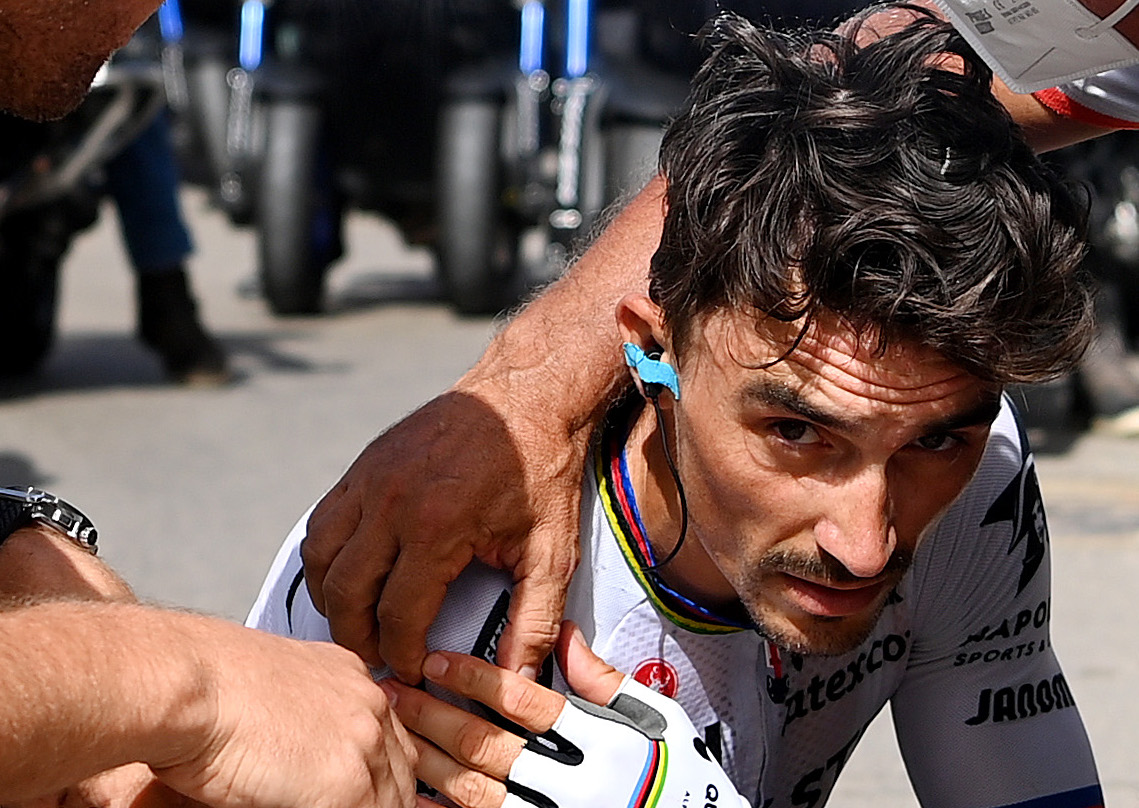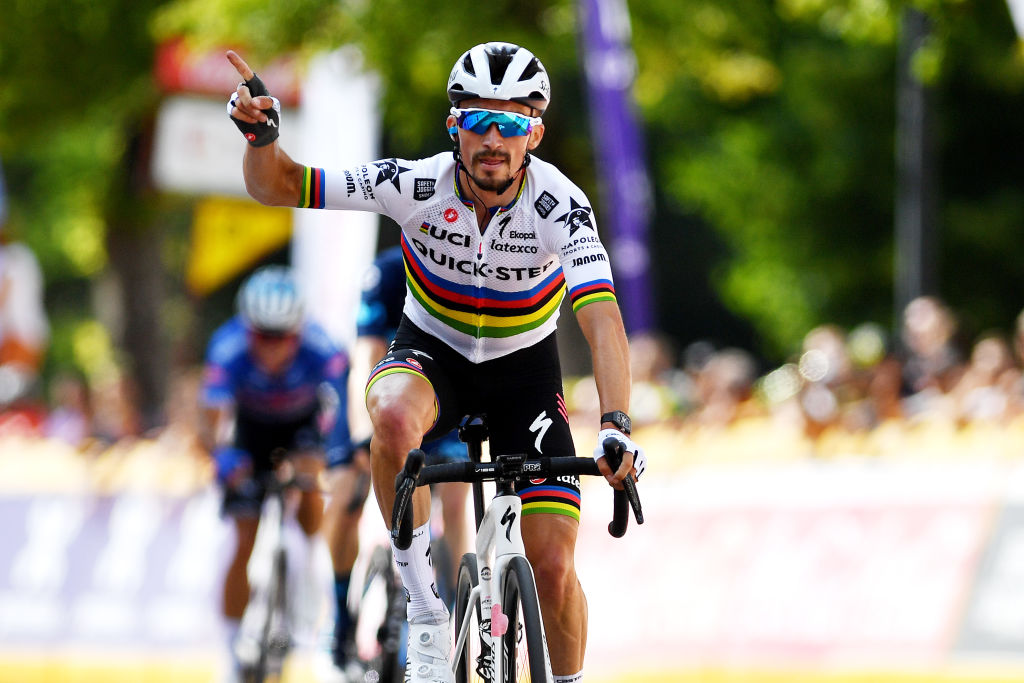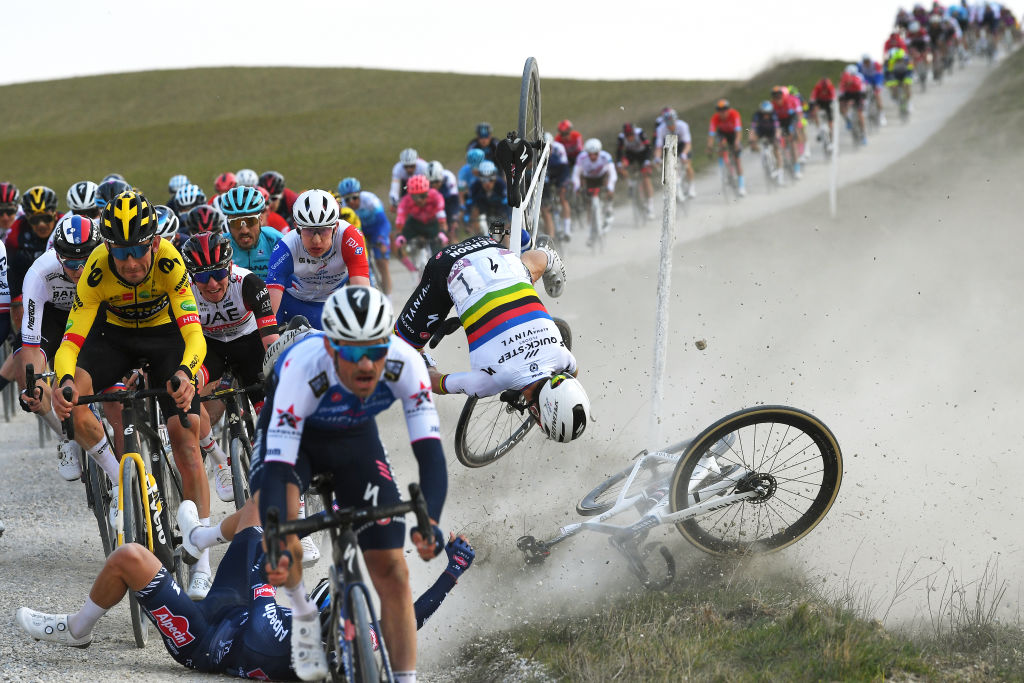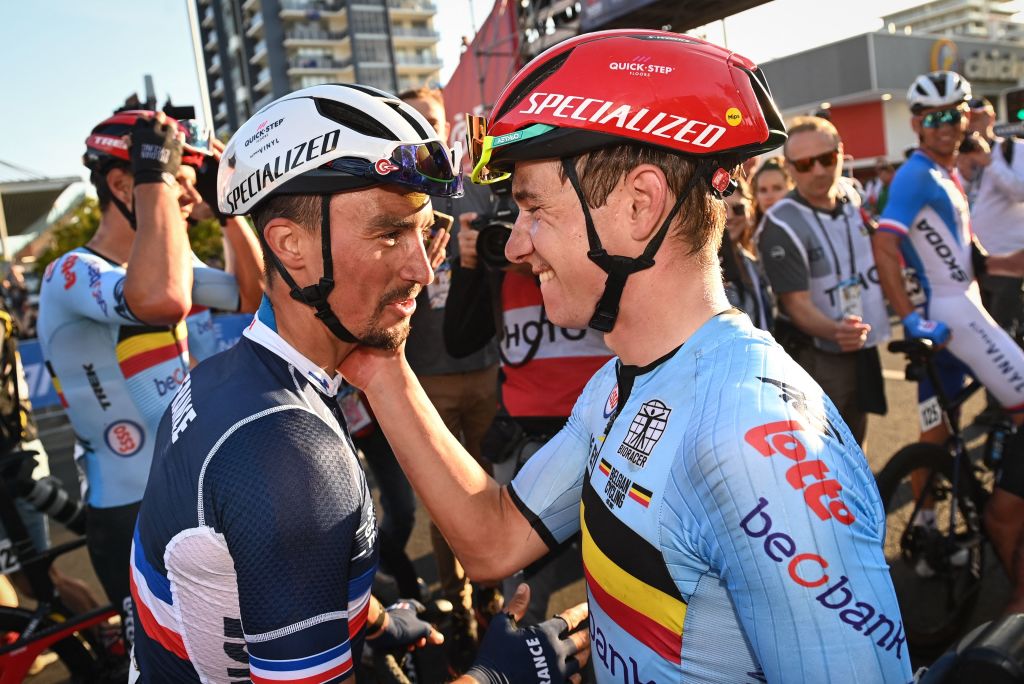Julian Alaphilippe: It was the hardest season of my career
Frenchman on overcoming setbacks and targeting the Tour of Flanders in 2023

Crashes, injury and COVID-19 have forced Julian Alaphilippe to add a new word to his vocabulary and a new facet to his mindset in 2022, with the usually playful two-time world champion discovering his inner resilience while forging through a season of pain and setback.
“Resilient is a perfect word to describe the emotions of my season and how I needed to make it through everything. 2022 was definitely a season of resilience,” Alaphilippe tells Cyclingnews in an exclusive end-of-season interview.
“I was never at 100% at a race in 2022, I was always fighting back, so it was hard to balance that with my usual hopes and my ambitions, especially while wearing the world champion’s rainbow jersey. I wanted to win like I so often have done but the setbacks just kept coming.
“I always trained hard, gave my best and fought to come back each time but it was a difficult season. Coming back time and time again was actually harder than the crashes. The pain was perhaps less acute but it took a lot longer.
“I need resilience for a long time. Fortunately I found that inside myself while away from the races and recovering. It’s important to have inner resilience when you're a rider and face problems, otherwise it’s even harder to come back after each problem.”
The QuickStep-AlphaVinyl rider raced for just 45 days in 2022, only winning stages at Itzulia Basque Country in April and at the Ethias-Tour de Wallonie in late July, as he tried to recover from injury and rebuild his form over and over again.
He started the season chasing form after missing a key training camp due to a nasty cold. Then he flipped over his bike in the crosswinds at Strade Bianche, which hindered his build-up towards La Flèche Wallonne and Liege-Bastogne-Liege.
The latest race content, interviews, features, reviews and expert buying guides, direct to your inbox!
His sprint win in the Basque Country and fourth on the Mur de Huy lifted his morale and ambitions, but he was caught-up in a terrible high-speed crash at 73 km/h at Liege-Bastogne-Liege. He was diagnosed with two broken ribs, a broken scapula and a punctured lung. The injuries kept Alaphilippe off the bike for a month and a lack of real form forced him to miss the Tour de France.

When he won atop the Mur de Huy at the Tour de Wallonie in late July, his fortunes finally seemed to be on the turn, but he was sidelined by COVID-19 almost immediately afterwards. He came back to ride the Vuelta a España only to slip out on a dry corner and dislocate his shoulder. He fought the pain to ride the World Championships in Australia and ended his season at Il Lombardia after a roller-coaster eight months of racing and recovery.
The only consolation for his problems and time away from racing was the possibility to spend more time at home, with his partner Marion Rousse and their young son Nino, who was born in June 2021.
“It was the hardest season of my career, my family was fundamental in helping me overcome every setback,” Alaphilippe says, his voice more serious, his mood slightly more saddened, than the playful character he often portrays at races.
“It was a tough few months but on the other side, I had the chance to spend some quality time with my son and family. That really helped me a lot. The support and love of your family is the most beautiful reason to smile at any problems in life and to continue to fight back.
“Nino puts everything in life into perspective for me. You can be world champion and crash a lot but at the end of the day you still have to go home and care about your family. He’s too young to understand that I race bikes or to understand what I went through this year, so spending so much time with him helped me put everything in perspective. It made me understand what is important in life.”
Mental scars and racing fears

Alaphilippe is considered one of the best bike handlers in the peloton. He seems able to jump around and survive any obstacle even in the most technically demanding races. He attacks with panache, surges away and wins, making victory look easy.
He is perhaps like a cat with nine lives, but perhaps used two when he crashed out of the 2020 Tour of Flanders and at this year’s Liège-Bastogne-Liège. He still wants to race but 2022 has left some mental and physical scars.
“When it’s dangerous on descents, I feel a little bit more afraid of crashing compared to before. That doesn’t mean I’ll brake more or that I’m shit at descending now. But I have to admit that I sense the dangers a little more," Alaphilippe admits.
“Fortunately I have zero pain now when I ride the bike, so I'm not scared to race and nothing will hold me back in 2023.”
Alaphilippe’s high-speed crash at Liège-Bastogne-Liège was sparked by a fight for position and a touch of wheels. He slid out on some unexpected dust at speed during the Vuelta a España.
The crashes have made Alaphilippe reflect on the many and perhaps ever increasing number of crashes in professional cycling but he doesn’t feel able to offer a full explanation or solution.
“When you crash a lot, you’re more careful than those who have never been through a big crash and a long recovery,” he points out.
“But cycling was dangerous 10 or 20 years ago too. Bike racing is intrinsically a dangerous sport, we all know that. I don’t really know why crashes happen; there are probably a lot of reasons. For sure the speed is higher and the bikes are more performant, so we all push things to the limit.
“Sometimes the parcours are dangerous, as we saw in the CRO Race in Croatia at the end of the season. I don’t know why the UCI accepts a finish like that on the final stage but the riders are responsible for riding their bikes and calling for better safety, it’s up to us to look out for each other too. But there’s also more pressure and more expectation, so everyone wants to be at the front at the same moment in every race. I don’t think that will ever change, it’s the nature of racing.”
Back to the Tour of Flanders and Tour de France in 2023

Alaphilippe has kept a low profile since finishing Il Lombardia, enjoying his off-season with Marion and Nino, and only posting occasional photographs on Instagram as he recovers from the fatigue of 2022.
He watched the Tour de France presentation with pride from home, happy for Marion to be in the spotlight as she presented the second edition of the Tour de France Femmes.
“She’s got a lot of responsibility but it’s special to see your partner playing such an important role. I’m very proud of her,” he says.
“It means we’re away from each other more than before but I’m happy for her because I know she’s doing a great job and really cares about women’s cycling.”
Alaphilippe will soon begin his pre-season training and join his teammates for a training camp just like every winter. Despite all the problems of 2022, he is looking forward to 2023, relishing new and old goals in the spring and summer.
“I'm looking forward to a good winter of training and so being able to fight again to win big races in 2023,” he said, with ambition still alive and smouldering in the quiet months of the cyclist’s year.
QuickStep-AlphaVinyl will become Soudal-Quickstep in 2023, with Remco Evenepoel’s success elevating him to a new level in the sport and within the Belgian team. That shouldn’t affect Alaphilippe’s race programme; indeed, the two riders’ ambitions are complementary.
Evenepoel will only reveal his Grand Tour plans at the team’s official presentation in early January. Alaphilippe does not yet know his racing plan in detail but is not afraid to lay out his hopes and ambitions in the two biggest races of his 2023 season. Both are Tours, but of different kinds: the Tour of Flanders and the Tour de France.
“I loved watching the Tour of Flanders on television as a kid. I only rode the Tour of Flanders for the first time in 2020 and crashed out as everyone recalls, but it was one of the races I love the most,” he recalled.
“It’s a painful race, it’s physically and mentally demanding but it’s a race I enjoy riding. For sure, next year I’ll be out to target the Tour de Flanders. I’ll ride the Ardennes Classics too, but the Tour of Flanders is at the top of my list for the spring.”
Alaphilippe won his first stage in the 2018 Tour de France but his 2019 performance stands out and sparked the French fans’ love of ‘Loulou’, as he is so often affectionately called.
He won stage 3 and pulled on the yellow jersey, keeping it through the Vosges and the Pyrenees, the whole of France cheering him along in the hope he could win in Paris, even if they knew he would need a miracle.
Egan Bernal surged away on the stage to Tignes and was declared the new race leader despite a landslide cancelling the stage, and the Colombian went on to win in Paris. Alaphilippe finished fifth but was still proud of his Tour and long spell in yellow.
He took the yellow jersey again in 2020 and 2021, fueling calls for him to target the overall classification. He has wisely avoided the hype and expectation but is ambitious for the 2023 Tour de France after missing this year’s race.
“The Tour de France is like no other race. Everything you do in the Tour has a special emotion too. The Tour is unique,” Alaphilippe said with genuine emotion and French pride.
“As a Frenchman everyone expects me to do something but as a rider I also want to do well and want to perform there. I’ve got some great memories from the last few Tours. both for the results I achieved and for the affection and support of the public on the race.
“I really want to go back to the Tour in 2023 and ride in my best shape. When you are in good form and you do well, you can really enjoy it. Success takes away the pain of the Tour and of any other moment.”
Evenepoel is likely to target the Giro d’Italia but he, sprinter Fabio Jakobsen and Alaphilippe could perhaps join forces in a Soudal-QuickStep’s Tour de France dream team.
Alaphilippe refused to reveal the team’s plans but his affection for Evenepoel is clear. The two are close, more like brothers than teammates, so there is no rivalry. Indeed, when they do race together, they often work for each other. Alaphilippe was one of the first to congratulate Evenepoel after the Wollongong World Championships.
“We’re two very different riders but we have a good relationship,” Alaphilippe said.
“He had a special season by winning so much. He also won QuickStep’s first Grand Tour, so nobody deserves to take the rainbow jersey in 2022 more than Remco. I’m super happy to have passed on the rainbow jersey to him and so also kept it in our team.
“I’m happy for him to have the spotlight that comes with the rainbow jersey. I’ll be happy to pull on the blue and white team jersey again and get back to being the rider I was before my problems of 2022. That’s my first goal for the new season.”

Stephen is one of the most experienced member of the Cyclingnews team, having reported on professional cycling since 1994. He has been Head of News at Cyclingnews since 2022, before which he held the position of European editor since 2012 and previously worked for Reuters, Shift Active Media, and CyclingWeekly, among other publications.